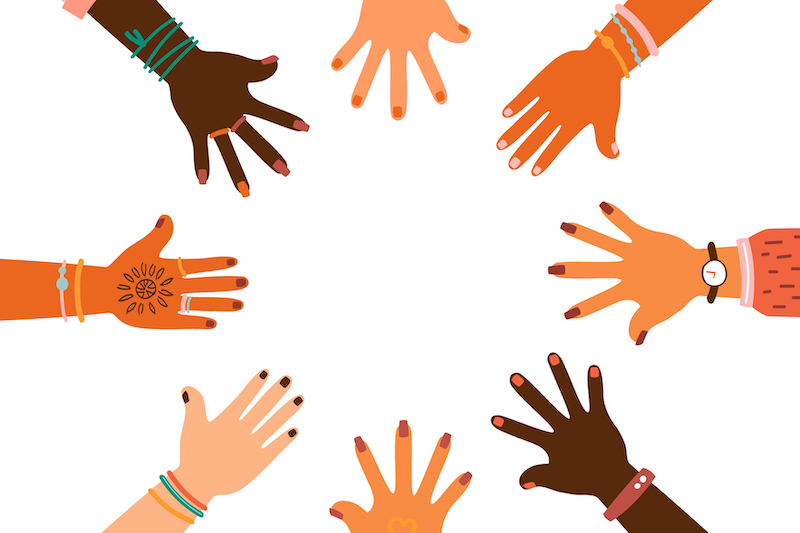SHADES of Life as Systemic Practice 1/5: An Introduction
-
-
Sonya Welch-Moring
How can we safely uncover and explore colour dynamics – in our client work, our personal lives, and as a profession? Sonya Welch-Moring is a systemic therapist and Ancestral Constellations practitioner who has been developing a creative embodied approach for individual and group work. In this new five-part series, she explains how SHADES of Life can help all therapists to talk about colour, power and inequality… and to take action.

A couple of years ago I was asked to write a short piece on my identity for Therapy Today, entitled, ‘Where are you really from?’ My initial reaction – South American, Guyanese, Caribbean, Black Brit – was somewhat of a mouthful. But the piece left me reflecting on my relationship with ancestry, culture, colour and country. I used the opportunity to start thinking about how to apply these themes to my work.
Since 2011, I have been integrating the family constellations approach into my systemic practice. This is an embodied brief therapy and a way to explore your family tree and ancestral line over generations. The intention is to surface unresolved relationship patterns, in order to intervene in the current generation and bring more healing to the family system.
Issues of identity and belonging are also integral to the work. One of the tasks of the constellations process is to help people find their place of belonging in the family system. For me, it took personal learning and professional training in the systemic constellations method, and several journeys back to ancestral homelands in South America and Africa, before I finally found a sense of peace in my identity.
I am now using the family constellations method with many people of African heritage. I have adapted the process, integrating some concepts that better speak to Black Transgenerational Lives. And in response to white colleagues asking me about my Ancestral Constellations practice, I have started developing SHADES of Life, individual and group sessions that explore multi-colour-culture issues in family and community life.
Many therapists and counsellors from all backgrounds have shared with me how difficult it can be to raise issues of colour within therapy and counselling spaces. Resmaa Menakem, in his 2017 book My Grandmother’s Hands, writes about how experiences around colour and race are stored as trauma within the body. This can include fear, anger, frustration, silence and silencing. SHADES of Life is an embodied process and a response to our often-binary way of thinking about race, exploring colour and its impact on our identity and belonging in family relationships and wider society.
Family constellations work involves using creative tools, or group participants, to represent a client’s family members. I moved my practice online during Covid, and now use a large collection of small figurines, my ‘Diaspora dollies’. Clients choose a ‘representative’ for themselves as well as other people in the system – parents, grandparents, siblings etc. They then create a transgenerational constellation by positioning the dollies in relationship to each other in the constellation space – a table top or a floor mat. The current generation is represented and previous generations are often added: parents, grandparents and, sometimes, great grandparents can be brought into the constellation.
This use of small dollies in different shades of colour aims to move the conversation from talk to action. It is an embodied visual approach that can give the client a different perspective on their situation.
I recognised the potential power of the application of the constellations process a few years ago when I was burgled, and a claims inspector came to my house. I had a basketful of the dollies next to my sofa and when she saw them, she reached out and picked up a couple of the dollies.
“Oh!” she exclaimed, holding up a couple of dark-skinned dollies, “these are my husband and mother-in-law and these…” (holding two pale skinned dollies) “… are myself and my mother”.
She had immediately recognised a part of her family dynamic by looking at and holding the dollies, and she told me that she was “excited to explore this further”.
In this weekly blog series, I am going to describe in more detail the SHADES approach and explain how it can support exploration of colour dynamics within our personal lives and professional practices.
Sonya Welch-Moring is running a series of SHADES of Life circles, with a focus on colour dynamics in personal and professional contexts, in association with Psychotherapists and Counsellors for Social Responsibility. The next event is on April 24 and can be booked here. She will also be facilitating a workshop on SHADES of Life, at the online ISCA Conference (April 14-21).